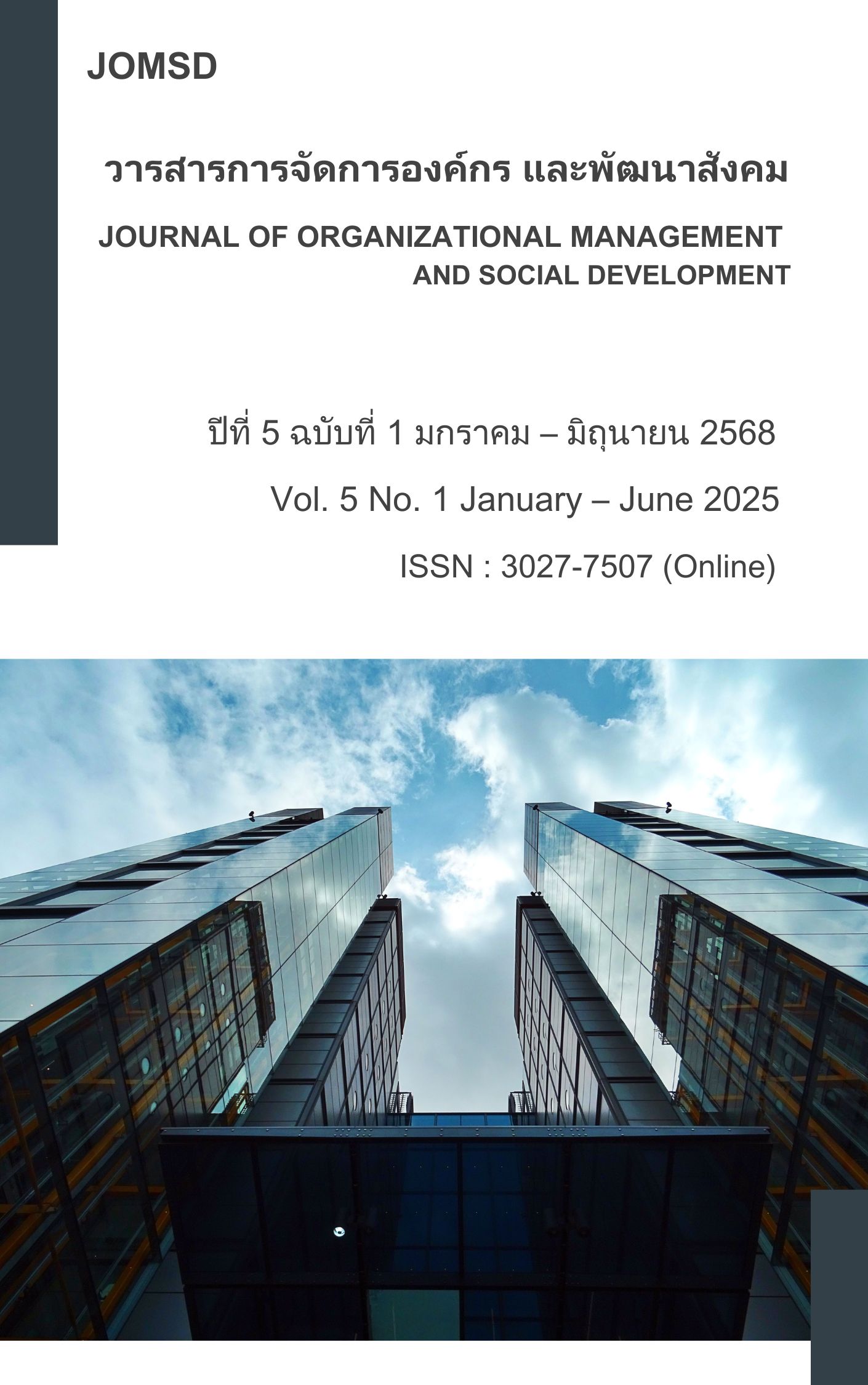Buddhist Integration for Enhancing Political Awareness Among Citizens by Administrators of Ubon Ratchathani Municipality, Ubon Ratchathani Province according to the 7 Sappurisadhamma principles
Main Article Content
Abstract
This article aims to 1) study the level of enhancement of political information awareness among the public by the executives in Ubon Ratchathani Municipality, Ubon Ratchathani Province, based on the principles of the Seven Noble Virtues; 2) examine the relationship between the principles of the Seven Noble Virtues and the enhancement of political information awareness among the public by the executives in Ubon Ratchathani Municipality; and 3) present Buddhist integration for enhancing political information awareness among the public by the executives in Ubon Ratchathani Municipality according to the principles of the Seven Noble Virtues. This study employs a mixed-methods research approach. The sample group consists of 400 residents from Ubon Ratchathani Municipality. The key informants include 2 personnel from the Buddhist community, 2 political science personnel, 5 local government personnel, and 3 local administrative personnel, totaling 12 individuals. The statistical analysis methods used include frequency, percentage, mean, standard deviation, Pearson correlation coefficient, and content analysis. The research findings indicate that 1) the overall level of political information awareness is moderate; 2) the relationship between the principles of the Seven Noble Virtues and political information awareness shows that the Seven Noble Virtues are significantly related to enhancing political information awareness at the .01 level; and 3) the Buddhist integration approach for enhancing political information awareness reveals that (1) avoid conflicts or opposition with the public; (2) support political awareness among the public; (3) continuously develop oneself to witness national changes; (4) perform duties with equality and integrity; (5) value time and be punctual; (6) understand the community and social context; and (7) be aware of the traditions, culture, and lifestyle of the people.
Article Details
References
ชิดชนก เชื้อแก้ว. (2558). ปัจจัยทีมีผลต่อการรับรู้ข่าวสารทางการเมืองในช่วงการเมืองสองขั้ว ของประชาชนในเขตอําเภอมะขาม จังหวัดจันทบุรี. (รัฐประศาสนศาสตรมหาบัณฑิต, มหาวิทยาลัยราชภัฏรําไพพรรณี).
เทศบาลนครอุบลราชธานี จังหวัดอุบลราชธานี. (2564). เลือกตั้งสมาชิกสภาเทศบาลและนายกเทศมนตรี 2564. สืบค้นจาก https://shorturl.asia/lacSj.
ธีรยุทธ ชะนิล. (2566). การประยุกต์หลักพุทธธรรมและการสื่อสารทางการเมืองของนักการเมือง เพื่อสร้างความนิยมสำหรับการเลือกตั้งระดับท้องถิ่นในจังหวัดนครศรีธรรมราช. (ปรัชญาดุษฎีบัณฑิต, มหาวิทยาลัยมหาจุฬาลงกรณราชวิทยาลัย).
บุญชม ศรีสะอาด. (2560). การวิจัยเบื้องต้น. (พิมพ์ครั้งที่ 10). กรุงเทพฯ: สุวีริยาสาส์น.
ประเวศ วะสี. (2565). สิ่งที่นายกรัฐมนตรีคนใหม่ควรทำ 10 ประการ. สืบค้นจาก http://www.komchadluek.net/detail/20110630/101798/.html.
ปราณี สุรสิทธิ์. (2557). การวิเคราะห์สถานการณ์ปัจจุบันเพื่อการสื่อสาร. กรุงเทพฯ: แปลน พริ้นติ้ง.
โปรดปราน เสริญวงศ์สัตย์. (2566). การประยุกต์หลักพุทธธรรมเพื่อส่งเสริมการตัดสินใจไปเลือกตั้งของประชาชน ในจังหวัดปทุมธานี. (ปรัชญาดุษฎีบัณฑิต, มหาวิทยาลัยมหาจุฬาลงกรณราชวิทยาลัย).
พระครูศรีปริยัตยาภิมณฑ์ (นพพล เขมนโว). (2566). การส่งเสริมการรับรู้ข่าวสารทางการเมืองของสำนักงาน คณะกรรมการการเลือกตั้งที่มีผลต่อการใช้สิทธิออกไปเลือกตั้งของประชาชนกรุงเทพมหานคร. (ปรัชญาดุษฎีบัณฑิต, มหาวิทยาลัยมหาจุฬาลงกรณราชวิทยาลัย).
พระครูอุปกิตปริยัติโสภณ (สุข สุมงฺคโล). (2566). พุทธธรรมาภิบาลเพื่อส่งเสริมการปกครองท้องที่ในจังหวัด อุทัยธานี. (ปรัชญาดุษฎีบัณฑิต, มหาวิทยาลัยมหาจุฬาลงกรณราชวิทยาลัย).
พฤทธิสาณ ชุมพล. (2556). ระบบการเมืองความรู้เบื้องต้น. (พิมพ์ครั้งที่12). กรุงเทพฯ: ห้างหุ้นส่วนจำกัดสามลดา.
มหาวิทยาลัยจุฬาลงกรณราชวิทยาลัย. (2539). พระไตรปิฎกฉบับภาษาไทย ฉบับจุฬาลงกรณราชวิทยาลัย. กรุงเทพฯ: โรงพิมพ์มหาจุฬาลกรณราชวิทยาลัย.
สุรพล พรมกุล. (2554). ระเบียบวิจัยทางรัฐศาสตร์. กรุงเทพฯ: โอเดียนสโตร์.
Klapper, J. T. (1960). The effects of mass communication. New York: Free.
Shaffee. (1975). An Introduction to Political Sociology. London: ThomasNelson and Sons.

